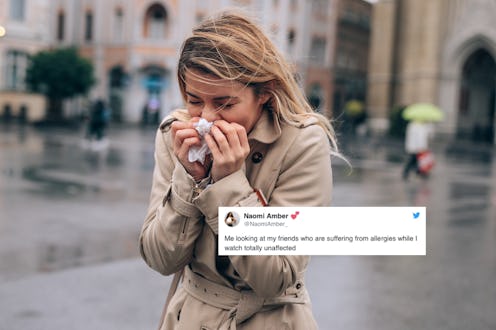
When I start to feel under the weather, my first thought is figuring out which bad habit to blame. Lack of sleep? Too much caffeine? Stressing my body out again? When you generally avoid healthy foods and habits like I do, it could really be anything. But if my vague illness is accompanied by other symptoms like coughing and sneezing, and it also happens to be springtime, I often wonder whether I have a cold or allergies. Having sinus pressure or a sniffling nose could have you questioning whether you just need a day off from work to recover and marathon Netflix — or if you'll be stuck with symptoms until allergy season ends. Allergy season usually starts in spring and ends in fall, so if your symptoms are seasonal in nature, you have a long wait ahead of you until they go away on their own.
New York City-based allergist and Flonase spokesperson Dr. Tania Elliott, MD, tells Bustle that people often don't seek treatment for allergies, which can further hurt you in the long run. "For whatever reason, people think allergies are a lifestyle thing and you should suffer through them," she tells Bustle. "Allergies left untreated can lead to chronic disease, sleep apnea, cognitive impairment, missed workdays and decreases in productivity." It's also possible to get some relief from allergies, aka you don't need to suffer all season long. Similarly, with a cold, sometimes rest can actually help you feel better faster — and if you think you're "just" having a bad allergy flare up, you might not take the sick day you really need. It's important to know whether you have a cold or allergies so you can decide on a treatment plan. Here are three tips from Elliott to help you determine what's up with your body.
1Pay Attention To The Timing
If you start to feel sick every year around the same time, there's a chance that it's not a coincidence. If you're expecting a cold in May because it's what usually happens, "the likelihood is that it's allergies," Elliott tells Bustle.
2Determine Whether Symptoms Are Lasting A Long Time
If you feel like you've been sick forever, you may have seasonal allergies. Healthline says you should feel fully recovered two weeks after a cold starts, and that's the maximum estimate — most people feel better before then. "If your symptoms are lasting 10 days or more, the likelihood is it's an allergy and not a cold," Elliott tells Bustle. She recommends using a nasal spray every morning to help mitigate the ickiness you feel when you've been sick for a while.
3The Symptoms
If you have a fever or swollen lymph nodes, you're probably dealing with a cold and not allergies, according to Elliott. But she says it's important to remember that allergies shouldn't be blown off. "Untreated allergies can set you up for developing infection," she tells Bustle. She recommends seeing an allergist before you start to feel crummy if you suspect you'll suffer this allergy season. "People wait until they develop symptoms and then treat them, which is the total opposite of what we want," she says.
Even if you haven't seen an allergist, you can make life easier for yourself by identifying triggers and avoiding them. For example, if high pollen levels make you feel poorly, try showering right when you get home to avoid tracking it into your home. But if you're in doubt about what's causing your symptoms, it's a good idea to talk to a medical professional. Whether it's a cold or allergies, Elliott says, serious or long-lasting symptoms shouldn't be ignored. "If you don’t treat it, it could lead to more serious issues." Godspeed, everyone — may this allergy season be mercifully short.